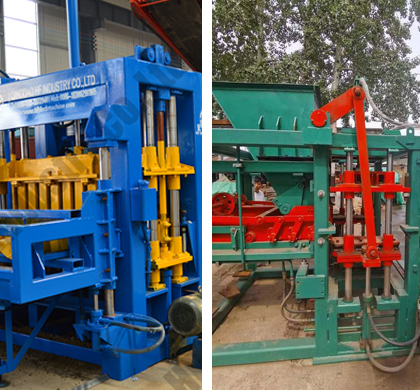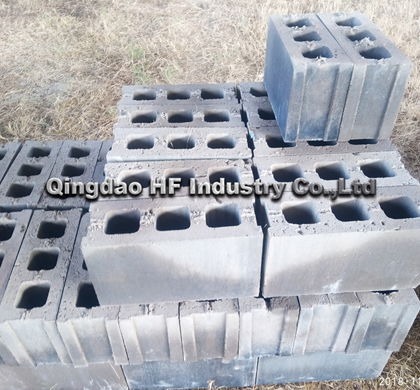Hollow blocks, also known as concrete blocks, are commonly used in construction for building walls, foundations, and other structures. Here are the general steps to manually make hollow blocks:

Prepare the mold: Construct a mold from wood or metal that is the desired size and shape of the hollow block. The mold should have a removable bottom or top to allow for easy removal of the block once it has been formed.
Mix the concrete: Mix the concrete according to the manufacturer's instructions. The mixture should be a combination of cement, sand, and gravel or crushed stone. Water should be added slowly to achieve the desired consistency. Aim for a consistency that is wet enough to pour but not too runny.
Fill the mold: Pour the concrete mixture into the mold, filling it to the top. Use a shovel or trowel to level the top of the mixture.

Insert the block-forming material: Place the block-forming material, such as a wooden or metal form, in the center of the mold. This will create the hollow space inside the block.
Add reinforcement (optional): If desired, add reinforcement, such as steel bars or wire mesh, to the center of the block to increase its strength.
Remove the mold: After the concrete has cured, remove the mold by loosening the sides and lifting the mold off the block. If the mold has a removable bottom, gently push up from the bottom to release the block.
Cure the block: Allow the block to cure for at least 28 days before using it in construction. Keep the block moist by covering it with plastic or spraying it with water periodically during the curing process.
Repeat: Repeat the process to create as many blocks as needed for your project.
Note: Always wear protective gear, such as gloves and a mask, when working with concrete to prevent skin and respiratory irritation.
This block machine is our QT4-26. Its an automatic hydraulic machine which can produce 3200-4400 blocks /8 hours, now is the most hot sale model machine we have, because its quality-price is the best, use the Siemens PLC and can produce color pavement too.it can make various blocks by changing block mould.


The Molding Vibration Block Machine has a short forming cycle and high production output. The continuous increase in vibration frequency during material feeding and forming vibrations reduces the feeding time by 3 to 4 seconds. The table vibration machine

Brick manufacturing has been an essential part of construction for centuries, providing durable and aesthetically pleasing building materials. However, the process of producing bricks is not without its challenges. As the world becomes more environmentall

Whether for inquiries for inspections and
maintenance, for individual plant optimizations or
extensions, or spare and wear parts.

Our after-sales service is at your disposal for all
questions

Gemini Tower, Block B, Chunyang Road, Chengyang District, Qingdao, China
Show on the Map
We will contact you within 24 hours.